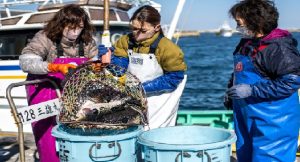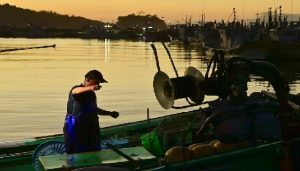27-08-2023
TOKYO: Japan’s fisheries agency has said fish tested in waters around the wrecked Fukushima nuclear plant did not contain detectable levels of the radioactive isotope tritium, Kyodo news service reported on Saturday.
 Nets were set up on Thursday when plant operator Tokyo Electric Power Company (Tepco) began releasing treated radioactive water into the Pacific, angering fishermen and many others in Japan, alarming consumers in neighboring countries and prompting China to ban Japanese aquatic products.
Nets were set up on Thursday when plant operator Tokyo Electric Power Company (Tepco) began releasing treated radioactive water into the Pacific, angering fishermen and many others in Japan, alarming consumers in neighboring countries and prompting China to ban Japanese aquatic products.
The agency plans to announce test results daily.
Tepco said on Friday seawater near the plant contained less than 10 Becquerel of tritium per litre, below its self-imposed limit of 700 Becquerel and far below the World Health Organization’s limit of 10,000 Becquerel for drinking water.
Tony Hooker, director of the Centre for Radiation Research Education and Innovation at the University of Adelaide, said the water released from the Fukushima plant is safe.
“It certainly is well below the World Health Organization drinking water guidelines,” he said.
 “It’s a very political issue of disposing radiation into the sea,” he said. “I understand people’s concerns and that’s because we as scientists have not explained it in a very good way, and we need to do more education.”
“It’s a very political issue of disposing radiation into the sea,” he said. “I understand people’s concerns and that’s because we as scientists have not explained it in a very good way, and we need to do more education.”
Still, some scientists say the long-term effects of the low-level radioactivity that remains in the water needs attention.
Beijing said they will “dynamically adjust relevant regulatory measures as appropriate to prevent the risks of nuclear-contaminated water discharge to the health and food safety of our country.”
Prime Minister Fumio Kishida said Japan asked China to immediately lift these regulatory measures.
“We will keep strongly requesting that the Chinese government firmly carry out a scientific discussion,” Kishida said, pledging to protect the fisheries industry from reputational damage due to the release. (Int’l News Desk)
 Pressmediaofindia
Pressmediaofindia




